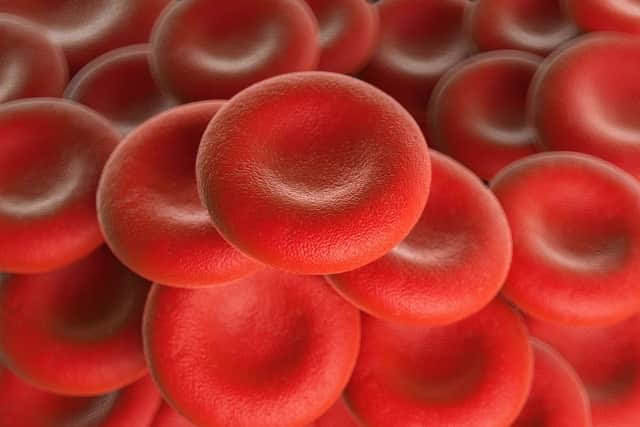Scientists develop blood test that could spot Alzheimer's


A cheap and simple blood test that could predict Alzheimer's disease years before symptoms start to show has been developed by scientists.
The test picks up tiny traces of amyloid beta - the sticky protein that clumps together in the brain and destroys neurons.
Advertisement
Hide AdAdvertisement
Hide AdThe breakthrough offers hope of widespread screening to identify individuals most at risk of being cut down later in life - and give them greater warning.


It may enable drugs to be prescribed in the earliest stages when they are most likely to work - and the encouragement of lifestyle changes that help stave off the illness.
The revolutionary technique was successfully tested on two independent sets of samples from more than 350 people in Australia and Japan.
It accurately picked out cognitively normal individuals, those with a kind of 'pre-Alzheimer's condition called mild cognitive impairment and patients with Alzheimer's.
Advertisement
Hide AdAdvertisement
Hide AdThe method, described in the journal Nature, works by looking for chemical signs or 'biomarkers' of amyloid-beta in plasma - a watery liquid in blood that carries the white and red cells.


Plaques made of the rogue protein are the earliest pathological signature of Alzheimer's - dotting the brains of patients decades prior to memory loss and confusion.
But the only way to detect them is with PET scans - which are expensive and not widely available - or a spinal tap which examines the cerebrospinal fluid and is very invasive.
A blood-based screening test would identify those who have started down the path toward Alzheimer's years before they could be diagnosed based on symptoms.
Advertisement
Hide AdAdvertisement
Hide AdToo little, too late
Scientists believe trials of drugs aimed at reversing or slowing dementia have all failed so far because they are given to participants too late - once their disease has taken hold.
Dr Katsuhiko Yanagisawa, an expert in dementia at the National Centre for Geriatrics and Gerontology in Japan, said: "These results demonstrate the potential clinical utility of plasma biomarkers in predicting brain amyloid-beta burden at an individual level.
"These plasma biomarkers also have cost-benefit and scalability advantages over current techniques - potentially enabling broader clinical access and efficient population screening."
Dr Yanagisawa said the need for a more cost-effective and less-invasive diagnostic tool is urgent.
Advertisement
Hide AdAdvertisement
Hide AdHis team's approach combines a technique known as immunoprecipitation that identifies proteins with mass spectrometry - a device that can measure thousands of chemicals a second.
This enabled them to calculate the amount of several amyloid-beta associated protein fragments in the blood.
When they tried it out on blood samples from 121 people from Japan and 252 from Australia - to validate the results - they found the ratios predicted the level of deposits in an individual's brain with 90 percent accuracy as measured by a PET scan.
The healthy human brain contains the protein but when it goes rogue it triggers dementia.
Shutterstock
Advertisement
Hide AdAdvertisement
Hide AdDr Yanagisawa said Alzheimer's disease drugs are expected to be most effective when patients are at the earliest stages of the disease - so these biomarkers may help in the selection of suitable clinical trial participants.
He said: "To facilitate clinical trials of disease-modifying therapies for Alzheimer's disease, which are expected to be most efficacious at the earliest and mildest stages of the disease, supportive biomarker information is necessary.
"The only validated methods for identifying amyloid-beta deposition in the brain - the earliest pathological signature of Alzheimer's disease - are positron-emission tomography (PET) imaging or measurement of amyloid-beta in cerebrospinal fluid.
"Therefore, a minimally invasive, cost-effective blood-based biomarker is desirable.
Advertisement
Hide AdAdvertisement
Hide Ad"Despite much effort, to our knowledge, no study has validated the clinical utility of blood-based amyloid-beta markers.
"Here we demonstrate the measurement of high-performance plasma amyloid-β biomarkers by immunoprecipitation coupled with mass spectrometry.
"Both data sets included cognitively normal individuals, individuals with mild cognitive impairment and individuals with Alzheimer's disease.
"All test biomarkers showed high performance when predicting brain amyloid-beta burden."
Advertisement
Hide AdAdvertisement
Hide AdSubstantial impact
As the brain engages in daily tasks, it continually produces and clears away amyloid beta.
Some is washed into the blood, and some floats in the cerebrospinal fluid, for example. If amyloid starts building up, though, it can collect into plaques that stick to neurons, triggering neurological damage.
Amyloid plaques are one of the two characteristic signs of Alzheimer's - the other being the presence of tangles of a brain protein known as tau.
Alzheimer's is the most common form of dementia and now affects more than 500,000 people in the UK - a figure expected to triple by 2050. Dementia affects the ability to remember, think and reason.
Advertisement
Hide AdAdvertisement
Hide AdDr Yanagisawa said: "The results suggest the plasma biomarker could be helpful for the differential diagnosis of Alzheimer's disease and aid in determining therapeutic strategies, by providing additional information on the brain amyloid-beta deposition status of individuals.
"As cost-benefit analysis of the use of PET for this purpose has proven controversial the impact of the plasma biomarker on daily clinical practice could be substantial."
He added: "The findings of the present study are considered to be robust, reproducible and reliable because biomarker performance was validated in a blinded manner using independent data sets - Japan and Australia - and involved an established large-scale multicentre cohort."